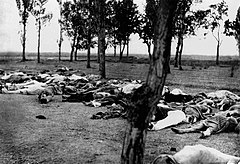
Back Misdade teen die Mensdom AF Verbrechen gegen die Menschlichkeit ALS جريمة ضد الإنسانية Arabic جريمه ضد البشريه ARZ İnsanlıq əleyhinə cinayətlər AZ Злачынствы супраць чалавецтва BE Престъпления срещу човечеството Bulgarian মানবতাবিরোধী অপরাধ Bengali/Bangla Zločini protiv čovječnosti BS Хүмүүнлигтэ эсэргүү гэмтэ хэрэг BXR

| Criminology and penology |
|---|
 |
Crimes against humanity are certain serious crimes committed as part of a large-scale attack against civilians.[1] Unlike war crimes, crimes against humanity can be committed during both peace and war and against a state's own nationals as well as foreign nationals.[1][2] Together with war crimes, genocide, and the crime of aggression, crimes against humanity are one of the core crimes of international criminal law[3] and, like other crimes against international law, have no temporal or jurisdictional limitations on prosecution (where universal jurisdiction is recognized).[2]
The first prosecution for crimes against humanity took place during the Nuremberg trials against defeated leaders of Nazi Germany. Crimes against humanity have been prosecuted by other international courts (such as the International Criminal Tribunal for the former Yugoslavia, the International Criminal Tribunal for Rwanda, the Special Court for Sierra Leone, the Extraordinary Chambers in the Courts of Cambodia, and the International Criminal Court) as well as by domestic courts. The law of crimes against humanity has primarily been developed as a result of the evolution of customary international law. Crimes against humanity are not codified in an international convention, so an international effort to establish such a treaty, led by the Crimes Against Humanity Initiative, has been underway since 2008.
According to the Rome Statute, there are eleven types of crime that can be charged as a crime against humanity when "committed as part of a widespread or systematic attack directed against any civilian population": "murder; extermination; enslavement; deportation or forcible transfer of population; imprisonment or other severe deprivation of physical liberty in violation of fundamental rules of international law; torture; rape, sexual slavery, enforced prostitution, forced pregnancy, forced abortion, enforced sterilization, or any other form of sexual violence of comparable gravity; persecution against any identifiable group or collectivity...; enforced disappearance...; the crime of apartheid; other inhumane acts of a similar character intentionally causing great suffering, or serious injury to body or to mental or physical health."[4]
- ^ a b Mettraux, Guénaël (2005). International Crimes and the Ad Hoc Tribunals. Oxford University Press. p. 320. ISBN 978-0-19-927155-9.
- ^ a b Margaret M. DeGuzman,"Crimes Against Humanity" Research Handbook on International Criminal Law, Bartram S. Brown, ed., Edgar Elgar Publishing, 2011.
- ^ Schwöbel-Patel, Christine (2020). "The Core Crimes of International Criminal Law". The Oxford Handbook of International Criminal Law. Oxford University Press. p. 768. ISBN 9780198825203.
- ^ "United Nations Office on Genocide Prevention and the Responsibility to Protect". www.un.org. Retrieved 18 January 2024.